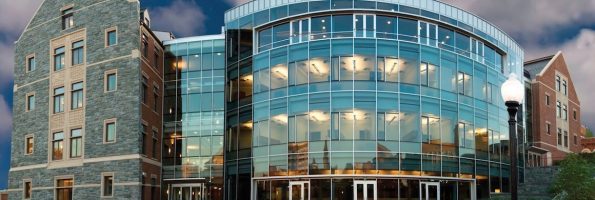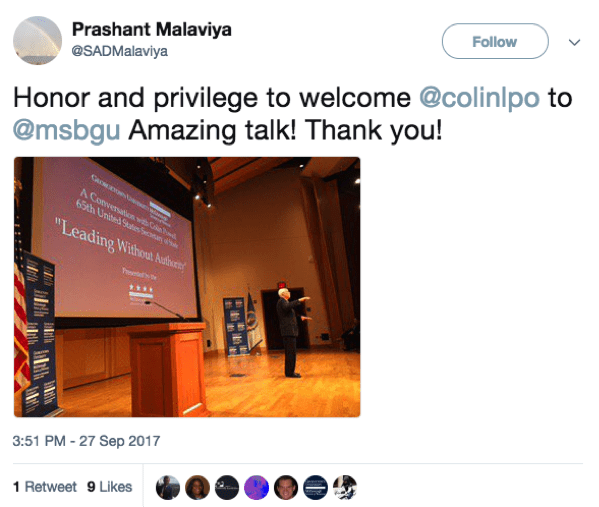What Georgetown McDonough MBA Students Learn Outside the Classroom

What do Colin Powell, an Indiana dairy farm, the DC Department of Public Works, and a triathalon have in common? They are all part of the fabric that comprises life outside of the classroom for MBA students at Georgetown University’s McDonough School of Business. Sure, it makes sense to judge a business school on what takes place inside the classroom. But in skimming three seemingly unrelated recent news briefs from the school, we realized that taken together they help paint a picture of what life outside the classroom can look like.
Former Secretary of State Colin Powell Speaks
In September, the former U.S. Secretary of State and Chairman of the Joint Chiefs of Staff Colin Powell visited Georgetown McDonough to speak on the subject of leadership. He discussed his former military and government experience, as well as a turning point in his career: earning his MBA. The event was part of the Stanton Distinguished Leaders Series and was hosted by the McDonough Military Association, an MBA student club for military veterans.
Faculty, staff, alumni, and students were all invited to observe the conversation, which began with Powell touching on his MBA education. He shared with attendees about how his MBA—which he earned from George Washington University in 1971—enabled him to focus “on the more human elements of leadership,” explained the McDonough press release. He also talked about how he improved his management and leadership skills by gaining a better understanding of basic human psychology.
Powell then went on to speak about his career. He shared his experience of being pulled in a variety of different directions, including public service positions, telling audience members: “You serve where you are needed. This is what service is all about.”
Then, he went on to highlight what he views as essential components of effective leadership, namely helping others, stressing the human element of an organization, and building trust. He explained that he never tried to be an authority but to influence others, stating “leadership and followership are completely enmeshed.”
Finally, he touched on the importance of diversity. “We are a vibrant economy because of immigration,” he said. “We shouldn’t demonize anyone.” He talked about how diversity is important for leadership and for building a stronger America. The event ended with questions from audience members and drew praise from many in attendance.
As Prashant Malaviya, an Associate Professor of Marketing at McDonough, said on Twitter: “Honor and privilege to welcome Colin Powel to Georgetown McDonough. Amazing talk! Thank you!”

Hands-On Experience
Outside of learning from presentations and speakers, MBA students at McDonough also learn through hands-on opportunities such as a recent visit to Fair Oaks Farms, a sustainable dairy farm in Indiana, as well as a summer internship with the DC Department of Public Works (DPW).
The farm visit, which included 18 MBA students, was part of the course “Principled Leadership in Business and Society” taught by Associate Professor Ed Soule.
The trip was designed to help students learn more about sustainable business by seeing it in practice. Fair Oaks Farm is the sixth largest dairy cooperative in the nation and an agri-tourism destination owned by Sue and Mike McCloskey. While visiting, MBA students were able to see how the farm employed various practices and technologies to minimize its environmental footprint while maximizing the comfort level of the cows.
“It’s one thing to read a case about a sustainable business, but seeing it and meeting the people adds another dimension,” Soule said in a news release about the trip. “The other objective of the trip was for them to interface casually with the McCloskeys, to pose questions, and get a more nuanced understanding of the business.”
Second-year MBA student Emma Loughman called the farm an “epicenter of innovation” and said she enjoyed learning about the difference between organic and sustainable farming.
As for the internship with the DC DPW, two students—Paul LaCorte (MBA ’18) and Leo Dzidziguri (MBA ’18)—participated in the trial program between the department and Georgetown McDonough. Over the course of the hands-on, three-month experience, the students responded to a request by the city administrator to evaluate two critical areas: light vehicle repair turnaround and citywide compliance and preventative maintenance.
The internship required data collection, analysis, visualization, process mapping, site visits, and audits. “We were involved in projects that required knowledge from multiple fields,” Dzidziguri said in a news release. “For example, I performed statistical analysis on several years of data to identify reasons why the Fleet Management division could not meet its key performance indicators, while at the same time studying the operations and recommending a new map for more efficient processes.”
Extracurricular Fun and Fitness
Finally, no MBA program is complete without a bit of friendly competition. Early in September, three Georgetown MBA students participated in the 12th Annual Nation’s Triathlon. Hall Wang (MBA ’19), Taylor DeVoe (Evening MBA ’20), and James Hesburgh (MBA ’19) signed up for a 1,500-meter swim, 26.2-mile bike ride, and 10k run relay—respectively. This was an opportunity for the MBA students to meet outside the classroom and campus to explore their common interests.
In a short news brief on the school website, Wang described the triathlon as a relationship-building experience. “I like to think we showed what the Georgetown MBA experience is all about,” he said. “Regardless of cohort or program, we build relationships and partake in our community, one fun adventure at a time. Ours just started with a really early alarm clock and ended with some sore body parts, but now we have an exciting story to tell.”
This article has been edited and republished with permissions from Clear Admit.
Where Are All The Salespeople Going? HBS Examines

The rise of e-commerce and precipice decline in the overall number of person-to-person sales didn’t require the insight of an ardent futurist.
With the monumental ascent of companies like Amazon and Alibaba, consumers steering away from the help of sales people was, perhaps, obvious. But the reality of why wasn’t simply because of modern convenience, finds Harvard Business Review.
The publication cites a 2015 report from research firm Forrester, which argued that by 2020 nearly “one million” people could lose their sales jobs. The damning figure is in direct contrast to the rise of what Harvard calls “social selling.” The term simply refers to salespeople utilizing specialized content and digital communication as a major part of their sales approach, which has helped build significantly stronger sales data, but comes with the cost of losing traditional sales techniques. Which would eliminate future jobs in the field.
“Social selling makes sense for achieving quota and revenue objectives for multiple reasons,” write authors Laurence Minsky and Keith A. Quesenberry. “First, three out of four B2B buyers rely on social media to engage with peers about buying decisions. In a recent B2B buyers survey, 53 percent of the respondents reported that social media plays a role in assessing tools and technologies, and when making a final selection.”
“In addition, more than three-quarters (82 percent) of the B2B buyers said the winning vendor’s social content had a significant impact on their buying decision,” they continue. “A LinkedIn survey found that B2B buyers are five times more likely to engage with a sales rep who provides new insights about their business or industry. Another survey showed that 72 percent of the B2B salespeople who use social media report that they outperformed their sales peers, and more than half of them indicated they closed deals as a direct result of social media.”
The success, ultimately, may be predicated on bringing forms of traditional sales techniques, social selling and the utilization of progressive communication tools.
“What’s more, sales and marketing can collaborate on information to ensure that their efforts are aligned and to identify common goals and metrics that both teams can support. Since sales pride themselves on their one-on-one relationships with customers, they can discuss with marketing customer successes and concerns, changing customer needs, customer questions and industry updates.”
Read the entire HBS report here.
Judge Students Develop Digital Opportunities for Lloyds Banking Group

Lloyds Banking Group and Judge Business School recently undertook a unique collaboration to look at innovative digital opportunities for banks and banking customers, according to a press release from the school. As part of the Mphil in Management program offered at Judge, students took part in a six-week program to better their understand of three key areas identified by Lloyds: identity, social, and gamification. Continue reading…
